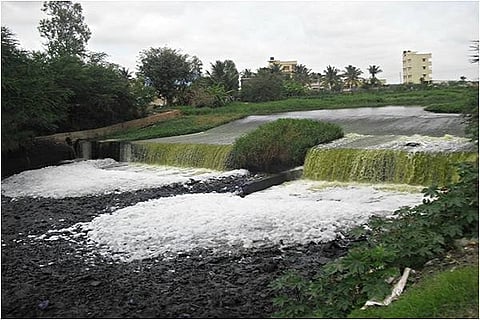

If you live near the Varthur Lake in the eastern suburbs of Bengaluru, then you have cause for concern. The water you drink might not be consumption worthy, according to a study conducted by the students of K.K. English High School in collaboration with the Indian Institute of Sciences (IISc).
Rohith and Pavan Kalyan, students of class 10 from K.K. English High School were disturbed by the dirt and contamination present in their neighbourhood lake. “When you have a disease, you worry about it. Similarly, when there is an unhealthy lake nearby, the children were concerned about the quality of water in the neighbourhood,” says Allu Irani, a teacher from the school.

A polluted Varthur Lake
The duo, along with five other students, set about sampling water from various bore-wells within a radius of 1 km from the lake. They inferred that the lake was responsible for groundwater recharge, which ultimately meant that the water in the bore-wells will be contaminated as well.
After identifying a sample of ten bore-wells from within the decided radius, water from these resources was collected. Working in tandem with scientists from IISc, the water was then tested for presence of various physical and chemical components.

Borewells wihin 500 mts from the Varthur lake
The team at IISc has been studying Varthur Lake, apart from 90 other lakes around Bengaluru for around a decade now. The institute regularly enlists the help of school students and other volunteers to conduct regular checks on the lake’s water quality. The project with K.K. English High school was one such venture, where the students used the institute’s labs to study the water and analyse the results.
Over the course of the study, it was observed that two bore-wells situated south-east to the lake had salt levels that were higher than the permissible limit. “Many of the groundwater resources have proved to be unusable because of the very high content of calcium and magnesium salts, which result in hardness,” said Dr Durga Madhab Mahaptra, a scientist from IISc, who helped the students table their report.
The analysis created doubts in the minds of the people who were using water from these bore-wells. The students subsequently approached doctors and specialists in Varthur to know about the implications and observed an increase in pathogenic diseases such as dengue and typhoid, which are waterborne. “This increase could be because of sewage water which is getting leeched into the groundwater resources; we don’t know the connection yet. Alternatively, it could also be because of improper sanitation around the water sources in the city,” said Dr Durga.
The high level of hardness in water not only obstructs formation of foam and lathering, rendering soaps useless; it could also lead to severe health problems, clarified Dr Durga. “When there is higher hardness in water, it results in stone formation in gall bladder and sometimes in the areas around the urethra and the kidneys. Also, it does not quench your thirst. Once this water enters your system, one also experiences problems in the alimentary canal, gut, appendix, liver and kidneys,” he said.
The students have educated their parents and local people about the ill-effects of water consumption from the polluted Varthur Lake. However, a lot more needs to be done in the form of awareness campaigns and health drives need to be conducted to sensitize people in the neighbourhood to the issue.
Images sourced from report submitted by Rohith and Pavan Kalyan
News, views and interviews- Follow our election coverage.
Click TN Election Special
Click Kerala Election Special